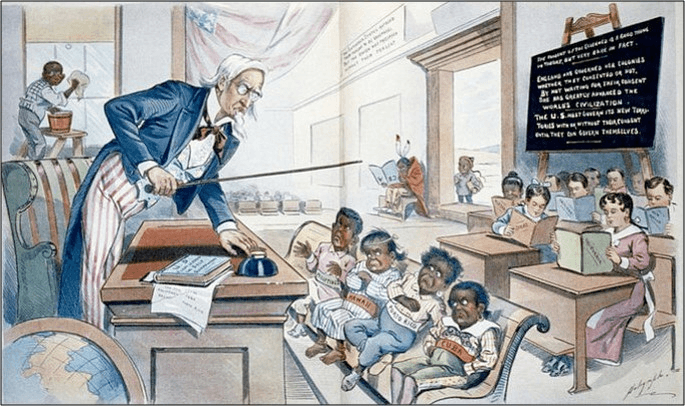The primary reason for US imperialism/overseas expansion.
Trade/new markets/expanded commerce/raw materials
Argued that empire reversed American traditions of self-government & anti-colonialism
Anti-imperialists
The mysterious explosion of this US warship near Havana, Cuba proved to be the spark that led to war between the US & Spain.
USS Maine
This imperialist president preferred using a forceful, power-politics approach to advancing US interests abroad, with a strong military to back up his demands. His favorite saying was "Speak softly and carry a big stick, and you will go far."
Theodore "Teddy" Roosevelt (1901-1909)
This was the name for immigrants who came from eastern & southern Europe (e.g. Russia, Poland, Austria-Hungary, Italy, Greece, etc.)
"New" Immigrants or the "New Immigration"
The fear that these rival empires might cut off the US from world markets & world power helped encourage US imperialism overseas.
European empires (Britain, Germany, Russia, et al.) & Japan
Approved of US annexation of the Philippines, Guam, & Puerto Rico
Imperialists
This sensationalized reporting distorted the truth about the Cuban-Spanish conflict in a way that influenced American opinions toward war with Spain
Yellow Journalism/Yellow Press
Big Stick Diplomacy helped secure this canal linking the Atlantic & Pacific Oceans, which had long been an ambition of American imperialists.
The Panama Canal
This most famous Gilded Age scandal involved a construction company that helped build the Transcontinental Railroad overcharging (defrauding) the federal government & then bribing Congressmen to look the other way.
The Credit Mobilier Scandal (1872)

The cartoon most likely depicts this reason for American imperialism.
The desire to spread American democratic and moral ideals.
The Filipino insurgents in the Philippine-American War (1899-1903) were led by this anti-imperialist.
Emilio Aguinaldo
This guaranteed that the United States would not annex Cuba after winning the Spanish-American War.
The Teller Amendment
This significantly expanded the Monroe Doctrine by claiming the US had "international police powers" to maintain stability & order among the nations of the Western Hemisphere.
The Roosevelt Corollary
This social reform movement was inspired by the teachings of the Christian New Testament, rejected Social Darwinism & Laissez-faire, & had more socialist leanings than capitalist.
The Social Gospel Movement
This type of sensationalized journalism promoted imperialism as a kind of manly, heroic adventure.
Yellow Journalism/Yellow Press
This famous 19th century American author was also an outspoken member of the Anti-Imperialist League
Mark Twain
Although Spain did not possess this island, the US decided to annex it during the Spanish-American War after the US found itself in possession of the Philippine Islands.
Hawaii (annexed July 1898)
This new policy of President William Howard Taft sought to substitute "dollars for bullets" by promoting US interests abroad with economic investments rather than military power.
Dollar Diplomacy
This Progressive reform allowed ordinary voters to nominate their party's candidates to run in general elections.
The direct primary system
The belief that it was God's will/plan for the US to continue to expand its influence & power overseas into all the world.
Manifest Destiny (updated edition)
The Philippine-American War (1899-1903) was sparked by what the Filipinos perceived as this betrayal.
The US annexation of the Philippines Islands (when Filipinos believed they would be given independence, as the Cubans were).
This president claimed to reject imperialism & promote "Moral Diplomacy" over material interests, but he ironically interfered militarily in more Latin American countries than any president in history.
Woodrow Wilson (Moral Diplomacy)
This constitutional amendment allowed ordinary voters to choose US Senators (rather than state legislatures).
The 17th Amendment
This American admiral's The Influence of Sea Power Upon History (1890) promoted construction of an all-steel, state-of-the-art navy; construction of a canal across Panama; & advocated for a network of overseas naval bases to protect US trade rights.
Alfred Thayer Mahan
This guaranteed that, while Cuba was declared officially independent, it would remain under the effective authority of the United States.
The Platt Amendment
Preventing monopolies from charging abusively high prices & paying workers abusively low wages was the purpose of these TWO antitrust laws.
The Sherman Antitrust Act of 1890 and the Clayton Antitrust Act of 1914
This Progressive law, passed in 1913, reformed the US banking system by giving public officials control over currency & interest rates in order to help maintain financial stability & grow the economy.
The Federal Reserve Act of 1913